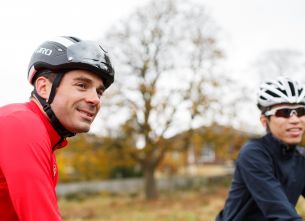We’re all familiar with that high you get from exercise and the endorphin boost you get when you smash a workout.
It’s a great mood-lifter, but for many people it’s even more than that; it can mean the difference between a good day and a bad day.
May is Mental Health Awareness Month, so we spoke to Dr Natalie Seymour, a Digme Fitness Ambassador who has a doctorate in psychology, used to play hockey for Great Britain and is now a professional triathlete.
Natalie works part-time with the charity MAC-UK, which works alongside young people to develop youth-led activities to improve their mental health and well-being. A big part of what they do is about getting outside and exercising.
She said: “Often people seek help and they are stuck in a small room with artificial light trying to explain why they feel bad. It’s so much more beneficial to get outdoors and go for a walk and talk through your problems.
“At MAC-UK, we organise football matches and gym projects. We take exercise very seriously as a part of promoting well-being.”
Like MAC-UK, many organisations are now recognising the importance of exercise in dealing with mental health problems, and the recent BBC documentary Mind Over Marathon, which followed ten people with mental health issues attempting to run the London Marathon, has done lots to raise awareness.
“Everyone has mental health,” Natalie continued. “Sometimes it’s seen as a negative thing and you only have mental health if it’s a bad thing, but that’s not true. It’s the same thing as striving for good physical health. It’s about finding things that keep you well.
“There is overwhelming evidence to say that physical and mental health are linked, and exercise is good for mental health.
“There are lots of aspects to it: there are the endorphins and the way it physically affects you straight after exercise. Then there’s the social and relationship aspect – you build friendships and networks through sports clubs or exercise classes.
“Having a sense of purpose is important for your mental well-being, so working towards goals and having things to look forward to are all important.
“Mind Over Marathon was really good at highlighting the value of exercise, but equally importantly it showed how people can help others with mental health problems.
“Something Nick Knowles said really stood out for me. He said you don’t have to try to rationalise what someone’s saying to you if they are struggling; you just have to listen. That’s so important.”
Although we can extol the virtues of exercising, it is often the actual process of beginning or starting somewhere new and unfamiliar that is too daunting, and people then can get stuck in a vicious circle.
Natalie has given her tips for overcoming anxiety when it comes to exercise and fitness:
-
Make it a habit. Do something that’s easily made part of your day. You could walk to work or walk part of the way.
-
Tell someone you’re going to do it. It makes you accountable but also is a way of sharing your achievements – no matter how small – afterwards with somebody.
-
Keep it varied. Don’t feel like you have to do the same thing every day. That’s why I like triathlon so much because there are three different parts to train at.
-
Do it with someone else – it introduces the social aspect and is more fun.
-
Normalise being nervous. Everybody feels daunted about joining a new club or a different fitness class. Normalise those feelings. It’s easier and harder for different people, but there’s nothing wrong with feeling anxious at the prospect of going somewhere new and you don’t need to beat yourself up.
-
Take one day at a time. It sounds cliché but I get up every day and think only about that day’s training. If I thought about the whole lot it would be so overwhelming I probably wouldn’t do anything! Take it bit by bit.
-
kind to yourself. Don’t worry if you make mistakes or don’t have a great session every time. Everyone will fail at some point – there’s no point in getting down on yourself about it.





COMMENTS (0)
Be the first to comment!
Please login to comment